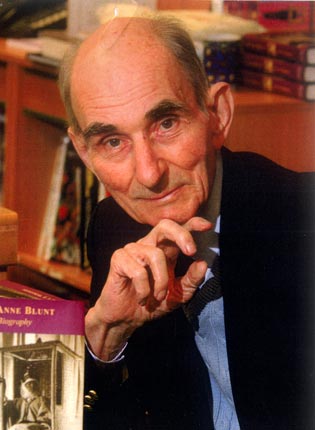H.V.F. Winstone: Writer, scholar and authority on the Middle East

Because my father, as a young British official in Mesopotamia, had been instructed by his boss, the High Commissioner Sir Percy Cox, to work directly under his Oriental secretary Gertrude Bell, and because he had taken me, as a child, to the remarkable home in Chelsea of his friend, the archaeologist Sir Leonard Woolley, who is best known for his excavations at Ur, it was natural that I should read the books of Victor Winstone, the prolific writer on Middle East personalities and politics.
Winstone's first solo book was published in 1972, a much praised biography of Captain Shakespear. It was Lawrence (of Arabia) who brought to light his fellow countryman's "magnificence" in Seven Pillars of Wisdom. Discovering that Shakespear had died heroically at the side of the founder of Saudi Arabia, Ibn Saud, Winstone began a decade of research in Foreign, India and Colonial Office files. That investigation enabled him, at the start of the 30-year rule introduced by the Wilson government, along with one or two other researchers, to unlock the political records of many servants of the Raj and the home country, whose roles in Britain's imperial story had been obscured by official secrecy.
There followed a series of biographies in rapid succession: Gerard Leachman, known as "OC Desert" in the Mesopotamia campaign of 1914-1918; Gertrude Bell, "the lady" of Iraq whose friendship with Lawrence had been instrumental in persuading Churchill in his days as Liberal Colonial Secretary to turn Iraq into a constitutional monarchy; and Sir Leonard, distinguished archaeologist, excavator of the Biblical land "Ur of the Chaldees". There was also a controversial study of military and political intelligence in the Middle East, The Illicit Adventure.
Born on 3 August 1926, Winstone spent his formative years in Essex, his education dramatically truncated by the approach of war. He left secondary school at 14 in 1939 with little academic achievement but at his mother's instigation was sent to South East Essex Technical College, one of the mighty new techs that appeared between the wars. With excellent teachers to promote his quick powers of learning and comprehension his interests broadened dramatically and quickly took on the political hues of the extreme "isms".
It was the heady time of the Nuremberg rallies, the Spanish civil war and the Mosley marches and international events led to intense debate which spilled over to suburban breakfast tables and student common rooms. As a convinced Marxist (with Shavian reservations) he went on in 1942 to the nearby Municipal College at Stratford to begin medical studies. But he had decided by then that his future lay with the written word, though without any clear sense of direction. The Royal Navy solved the problem and provided a tour of the Mediterranean, the Pacific Islands, Australia, the Red Sea and North Africa.
He entered journalism as a weekly newspaper reporter on demob in 1947 and graduated to writing for specialist journals devoted to the applied and decorative arts. He founded and edited several magazines in those fields and in the 1960s formed a partnership with an architect friend, Donald Dewar-Mills, which gave rise to a successful design and editorial enterprise. Following a bout of tuberculosis, he established his own office at 71 Fleet Street, in the thick of the newspaper and agency world in the mid-1970s which led to a journey to Kuwait, to conversion on the road to Saudi Arabia, and the beginning of his literary onslaught on the Middle East which, he always insisted, was badly in need of protection from the all-pervading legend of T.E. Lawrence.
In 1991 Victor Winstone achieved another unsuspected "first" with his biography of Howard Carter, discoverer of the tomb of Tutankhamun, which characteristically stressed the class bias in Britain's recognition of achievement. In a book that achieved world-wide praise, he pointed out that the most famous and lucrative discovery of all time, made by a self-taught Norfolk lad, had been rewarded with not a single official or academic honour, "not even a lowly MBE".
In our last phone conversation Winstone was appalled by the chaos in Iraq and the violation of archaeological sites and the museum in Baghdad. His most recently published book was War Without End, a critique of Anglo-US foreign policy from 1900 to the present, which with apposite timing, he launched online during the course of the Chilcot Iraq Inquiry while he was ill with lung cancer.
In his personal life he was devoted to numerous animal welfare causes and in Devon, where he and his pianist wife Joan Marigold lived for more than 20 years, he was an implacable enemy of the hunting lobby. His letters on that subject in the local press attracted much attention. He leaves four daughters and one son, and eight grandchildren.
Tam Dalyell
Harry Victor Frederick Winstone, scholar and author: born Ilford, Essex 3 August 1926; married Joan Cory (four daughters, one son); died Barnstaple 10 February 2010.
Join our commenting forum
Join thought-provoking conversations, follow other Independent readers and see their replies
Comments
Bookmark popover
Removed from bookmarks